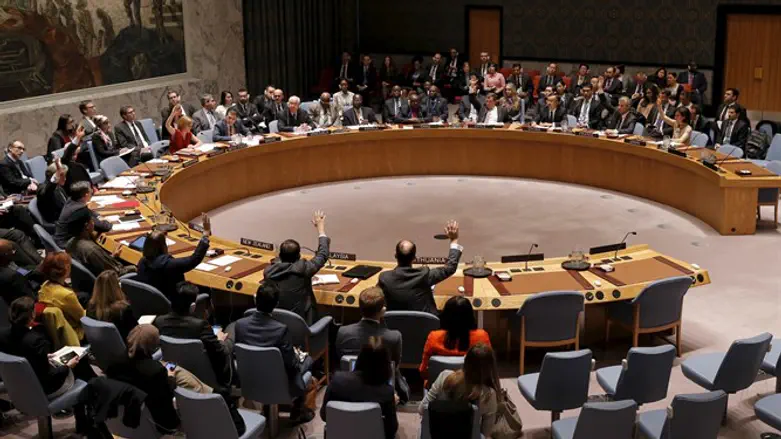
Israel and the United States are cooperating to persuade as many Western countries as possible to oppose, or to at least abstain from voting on, five anti-Israeli resolutions scheduled for voting at the United Nations Human Rights Council (UNHRC) on Friday, Haaretz reported on Monday, citing a Foreign Ministry official.
The five resolutions touch on the state of human rights in Judea, Samaria, Gaza, eastern Jerusalem and the Golan Heights. They also discuss Israeli construction in Judea and Samaria, and the need for accountability in respect to alleged human rights violations by Israel, according to the report.
The five decisions come up for voting yearly and are passed by a majority. While a large part of the most problematic parts for Israel were softened following discussions with the Palestinian Authority and European and Arab nations, the resolutions still level biting criticism at Israel.
Earlier on Monday, the United States boycotted a meeting on these resolutions, while the State Department issued a statement against the meeting.
As far as Israel is concerned, the most problematic part lies in the resolution touching on “settlements”, which will include a call on the nations of the world and private enterprises to stop all commercial activity with the “settlements”, according to Haaretz.
The resolution will also call for a special discussion on the topic of the settlements in the next meeting of the UNHRC later this year.
A top official at the Foreign Ministry assessed that the resolutions are likely to pass, since the PA gas an automatic majority in the UNHRC.
However, he stressed, Israel’s purpose is to ensure that the nations of Europe and other Western countries vote against the resolutions, or at least abstain from them. The senior Israeli official told Haaretz that the PA is trying to reach a consensus with the European nations about the formulation of the resolutions, to enable their vote of support.
He emphasized that Israel, with the help of the U.S., is trying to break the European consensus.
Israeli circles assess that if Germany and Britain decide to oppose the resolutions, or abstain, it would enable other countries in Europe, Latin America and Asia to oppose them too.
The United States has increasingly criticized the UNHRC over its anti-Israel bias since President Donald Trump took office.
Secretary of State Rex Tilleson recently threatened that the U.S. would withdraw from the UNHRC unless it stops its anti-Israel bias.
Defense Minister Avigdor Liberman asked Tillerson during a recent meeting between the two to reconsider American policy towards the UNHRC, noting that it “deals with the degradation of Israel and tries to harm it through distortion of reality.”
Prime Minister Binyamin Netanyahu raised the topic of withdrawing from the UNHRC with President Donald Trump and Vice President Mike Pence during his visit to Washington in mid-February. A top Israeli official said it was agreed that Israel and the U.S. would hold talks on the matter to shape joint policy toward the UNHRC.
“Our position is that the U.S. shouldn’t be on the [UN]HRC, and Netanyahu made that clear,” the official said, according to Haaretz.
The United States withdrew from the UNHRC under President George W. Bush but returned to it when Barack Obama took office.